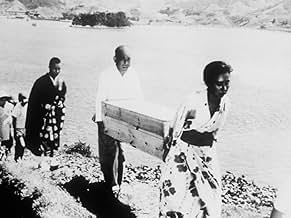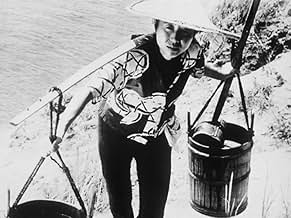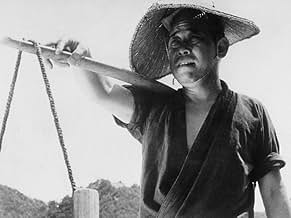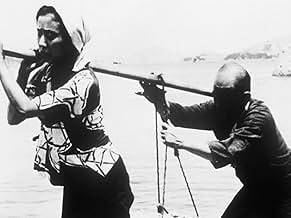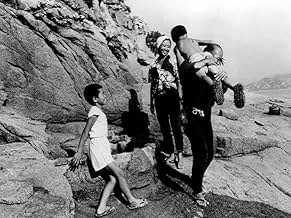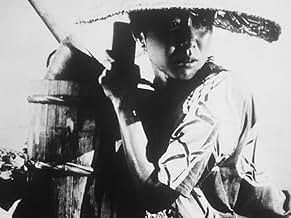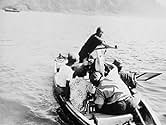IMDb RATING
8.0/10
6.7K
YOUR RATING
A family of four are the sole inhabitants of a small island where they struggle each day to irrigate their crops.A family of four are the sole inhabitants of a small island where they struggle each day to irrigate their crops.A family of four are the sole inhabitants of a small island where they struggle each day to irrigate their crops.
- Nominated for 1 BAFTA Award
- 5 wins & 1 nomination total
- Director
- Writer
- All cast & crew
- Production, box office & more at IMDbPro
8.06.6K
1
2
3
4
5
6
7
8
9
10
Featured reviews
10ewc
One of the finest films ever made.
If you have ever wondered what a film would be like that exemplifies how the tools of the craft can be used to do powerfully what no other art can do, this film answers the question. It is among the most carefully wrought, least encumbered yet profound movies ever made. The fact that it has long been unavailable in America and Europe in any accessible format reflects very sadly upon us all. (Addendum 15 March 2008 for those of you with region-free players: the English distributor, Eureka, has thankfully released the original widescreen version of the movie in PAL format in its 'The Masters of Cinema Series', #12, with an optional commentary by Shindo and his composer, Hikaru Hayashi. Available from Amazon.uk.)
Beautiful, moving and brutal
On a tiny island in the Seto Inland Sea, a small family consisting of husband, wife, and two sons, struggle to get by. They are the island's sole inhabitants, and spend their days fetching water from the mainland and carrying up the steep hill in order to water their crops. One day when the mother and father are away from the island, one of the sons falls ill, and the father races to get help. Their lives are all portrayed in painstaking detail, and the film contains no dialogue whatsoever. The film is directed by Kaneto Shindo, who directed the two brilliant Japanese New Wave horror films, Kuraneko and Onibaba, the only two other films of his I've seen.
This is a break in style and subject for Shindo. The two aforementioned horror films were similarly slow and detailed, but The Naked Island contains no action or atmosphere, but certainly shares their beauty. This is a film that shows how far humanity can be pushed in order to merely get by. The climax of the film (and I don't feel I'm ruining anything by revealing it, the story is not important) has their ill son dying, as his father and the doctor arrive too late. After the funeral, they are forced back to work. The mother, needing to grieve, throws down the water and screams into the ground, as the father watches helpless. Afterwards, she gets up, and methodically resumes watering.
Shindo tackles a universal subject with the neglect of the working class. Filmed with no dialogue, it emphasises their facial expressions and body movements in a way the silent era did, and forces the audience to live through the work they do, every step at a time. The director said he wanted to "capture the life of human beings struggling like ants against the forces of nature," and he certainly does that. The film is slow, and focuses a lot of time on the struggle of carrying the water up the hillside. Yet it's filmed with such elegance, it only hammers their struggle home. This is a beautiful and moving film, that is almost brutal in its relentlessness.
www.the-wrath-of-blog.blogspot.com
This is a break in style and subject for Shindo. The two aforementioned horror films were similarly slow and detailed, but The Naked Island contains no action or atmosphere, but certainly shares their beauty. This is a film that shows how far humanity can be pushed in order to merely get by. The climax of the film (and I don't feel I'm ruining anything by revealing it, the story is not important) has their ill son dying, as his father and the doctor arrive too late. After the funeral, they are forced back to work. The mother, needing to grieve, throws down the water and screams into the ground, as the father watches helpless. Afterwards, she gets up, and methodically resumes watering.
Shindo tackles a universal subject with the neglect of the working class. Filmed with no dialogue, it emphasises their facial expressions and body movements in a way the silent era did, and forces the audience to live through the work they do, every step at a time. The director said he wanted to "capture the life of human beings struggling like ants against the forces of nature," and he certainly does that. The film is slow, and focuses a lot of time on the struggle of carrying the water up the hillside. Yet it's filmed with such elegance, it only hammers their struggle home. This is a beautiful and moving film, that is almost brutal in its relentlessness.
www.the-wrath-of-blog.blogspot.com
10billr-3
a perfect movie
I remember this film from my student days. I saw it in an uptown, shabby, art house theatre (when art meant porn) in Philadelphia. I was amazed. As I recall, it is a film without dialog. Not silent, but no dialog. Black and white, but singularly visual. Three, maybe four characters with self- effacing directing and camera work, it was as intimate as small off-Broadway theatre. I've seen nothing since as cinematic, or moving. No one I've ever met, has seen it. But I remember it vividly.
A Film Nonpareil
I was living next to the Seto Naikai (Inland Sea) at the time this movie was made, and marvel at its matchless, eclectic choice of images and atmosphere to convey the ambiance of the time and place. The photography, music, and restrained acting are perfection itself. The lack of dialogue helps, rather than hinders, its beautiful, simple story. It has captured a Japanese way of life and culture (actually lived by the director---the movie was made as a tribute to his parents) forever and in the very highest artistic sense. The movie is so genuine, so sympathetic to its participants and subject matter, that the viewer is softly, irresistibly, drawn in to share their travails. For years it has been a wonder to me why this classic film has been forgotten. Of the thousands of movies I have seen in my lifetime, this is the finest.
10pzzz
I saw this 30 years ago -- I walked out then in awe, and it's been on the top of my list ever since.
I came to the internet searching for information on this movie. Not only did I find it, but I found a comment that mirrored my own experience with the movie. I too saw it in my student days, nearly 30 years ago, in a Friday-night "cinema" series in the student union theater. I see it's listed as B&W; I remember it in color -- maybe colorized it in my head? No dialog, just music and environmental sound; gorgeous photography of the island, the sea, the brutally hard work ferrying water for the crops on the terraces. And we follow that work for a long long time; we go through impressed, to irritated (why don't they move to town for chrissake), to rage at being made to sit through this for so long, to numb resignation. So we're right where the characters are. Writhing in my seat, hoping it will come to an end. And then the brief scene that left me stunned, that made sense of all that lead up to it, two seconds of film that explain us in the universe. Like William, I've never met anyone else who's seen this movie. And I don't know if I could sit through it again. But I'm sure glad I did back then.
Did you know
- Trivia'Hadaka no shima' was made, in the words of its director, "as a 'cinematic poem' to try and capture the life of human beings struggling like ants against the forces of nature."
- ConnectionsReferenced in Century of Cinema: Nihon eiga no hyaku nen (1995)
- How long is The Naked Island?Powered by Alexa
Details
Box office
- Gross worldwide
- $14,673
- Runtime
- 1h 36m(96 min)
- Color
- Sound mix
- Aspect ratio
- 2.35 : 1
Contribute to this page
Suggest an edit or add missing content



